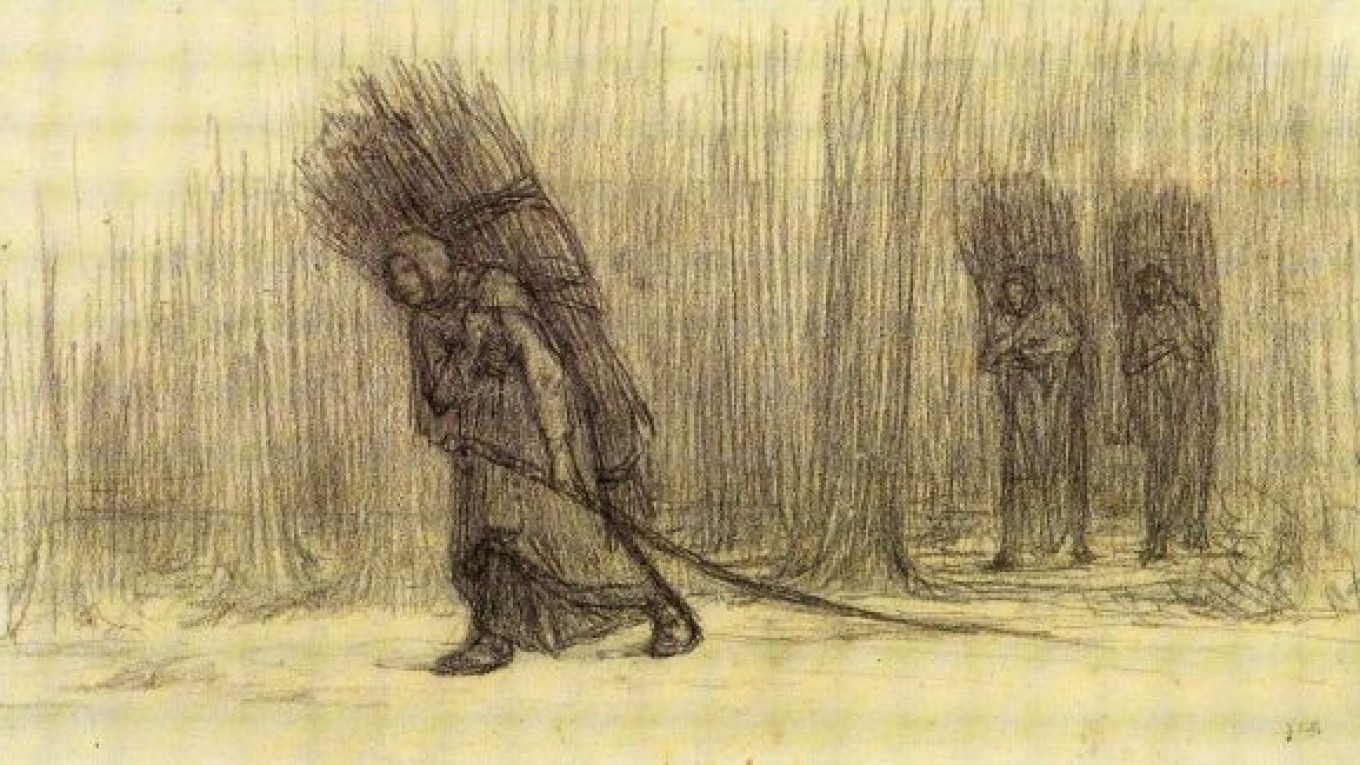Liza Dimbleby first moved to Moscow as a student in 1989, where "the streets became a sort of second home." Walking, watching and drawing, Dimbleby found a way to absorb the energy of the city. In her book "I Live Here Now," she treads the streets of Moscow, Glasgow and London, tracing her paths through memories and drawings.
In Moscow last week, she spoke of her relationship with drawing and the city at The International Moscow Book Fair, where she gave a talk on street drawing. "I only really discovered art just before I came to Moscow in my second year of university. Then, when I was here in Moscow, I just wanted to do nothing else but that."
For Dimbleby, the chaotic energy of the city combined with the challenge of capturing it in pencil keeps the perceptive process ever fresh, "like seeing through the eyes of a child."
Her pencil drawings depict strikingly diverse, vibrant city scenes. The book moves through the shifting rhythms of city life, with Dimbleby's pencil going from Moscow's perekhods, or pedestrian underpasses, to a lone prostitute on a bridge in Glasgow. Through walking and drawing, she is able to "gain a sense of intimacy, of gradually unravelling the city's secrets."
In a city like Moscow, clamoring with life and confusion, drawing offers a way to capture this flux for at least a moment, "the process of unraveling a line from a mass of chaos."
'The pencil line would serve as a thread through which you might draw yourself on through the city's labyrinth,' she writes in her book.
In the street Liza draws quickly, capturing fleeting impressions of passing crowds. In her book, she likens this to "a sort of Gogolian parade" since "you only have the time to seize, and draw the image or shape that makes the sharpest impression on your seeing, and that becomes the trace left by the passing person."
As a student in Moscow in 1989, Liza's favorite sketching haunt was the entrance to Kropotkinskaya Metro. Since then, that spot has changed dramatically, most notably with the rebuilding of the Christ the Saviour Cathedral.
An awareness of the transience of the city means that memory plays an important role in Liza's work. She writes, "Moscow's streets and corridors continued to live inside me, tenaciously, all the years that I was away."
The powerful relationship between drawing and memory was highlighted in the street drawing session that followed Dimbleby's talk. Rain meant that the streets had to be recalled from memory and for some this proved to be a particularly nostalgic endeavor. Sasha Mozhayev, a well-known local preservationist, sketched his favorite street retreat, a bench by Rozhdestvensky Bulvar, depicting it twenty years ago and then drawing it again as it is today, walled in and robbed of its trees.
"Those places where Moscow is still Moscow are becoming ever more valuable," Mozhayev said, "Places where people hang out on benches among cats and lilacs, where plastic double glazing hasn't replaced wooden window frames, where every home hides a wealth of tales and adventures."
In her work, Dimbleby is sharing something personal, her relationship with the city. Some curious boys once approached her on Petrovsky Bulvar and asked if she was drawing their street. Upon inspecting her work, they exclaimed, "She's drawing in her own way," capturing the very personal nature of her engagement with the city.
Liza Dimbleby's book "I Live Here Now: Writings and Drawings from Glasgow, London and Moscow" is published by Firework publishers.
A Message from The Moscow Times:
Dear readers,
We are facing unprecedented challenges. Russia's Prosecutor General's Office has designated The Moscow Times as an "undesirable" organization, criminalizing our work and putting our staff at risk of prosecution. This follows our earlier unjust labeling as a "foreign agent."
These actions are direct attempts to silence independent journalism in Russia. The authorities claim our work "discredits the decisions of the Russian leadership." We see things differently: we strive to provide accurate, unbiased reporting on Russia.
We, the journalists of The Moscow Times, refuse to be silenced. But to continue our work, we need your help.
Your support, no matter how small, makes a world of difference. If you can, please support us monthly starting from just $2. It's quick to set up, and every contribution makes a significant impact.
By supporting The Moscow Times, you're defending open, independent journalism in the face of repression. Thank you for standing with us.
Remind me later.






